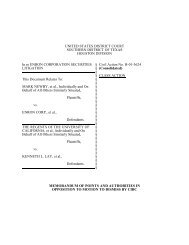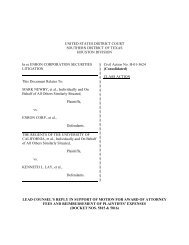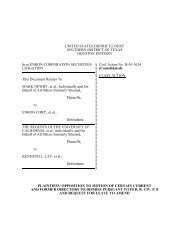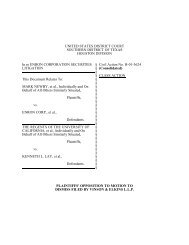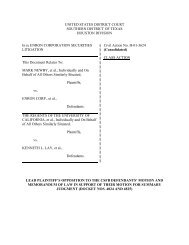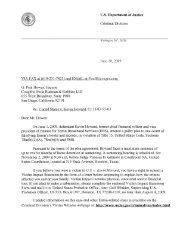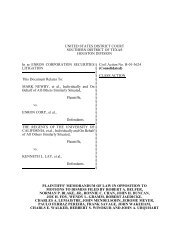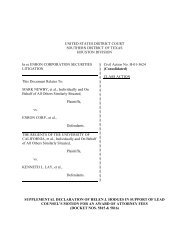Declaration Of Helen J. Hodges In Support Of Lead Counsel's ...
Declaration Of Helen J. Hodges In Support Of Lead Counsel's ...
Declaration Of Helen J. Hodges In Support Of Lead Counsel's ...
You also want an ePaper? Increase the reach of your titles
YUMPU automatically turns print PDFs into web optimized ePapers that Google loves.
Plaintiff had failed to properly allege claims for control person liability. <strong>Lead</strong> Plaintiff’s opposition<br />
argued that its claims were timely asserted, the offerings were public, and control person liability<br />
was adequately alleged. The Court ruled that the claims were timely filed, <strong>Lead</strong> Plaintiff had<br />
standing, and rejected the defendants’ contentions regarding the supposed private nature of the<br />
offerings, ruling that it was a fact issue not properly decided on a motion to dismiss. The Court also<br />
ruled that <strong>Lead</strong> Plaintiff had properly pled claims for control person liability. As such, the Court<br />
denied the motion to dismiss. See 4/6/04 Order re Bank of America Defendants’ Motion to Dismiss<br />
(Docket No. 2064) at 10-11.<br />
(f)<br />
Merrill Lynch argued that <strong>Lead</strong> Plaintiff had not alleged facts establishing that<br />
Merrill Lynch was a primary violator of the securities laws, and that <strong>Lead</strong> Plaintiff had not alleged<br />
loss causation for the Nigerian Barges transaction. With regard to the primary violator issue, Merrill<br />
Lynch argued that <strong>Lead</strong> Plaintiff’s claims were barred by Central Bank, claiming that Merrill Lynch<br />
did not have any special relationship to Enron’s shareholders, did not make any purported<br />
misstatements, did not direct or create the alleged fraudulent transactions, and did not participate in<br />
Enron’s accounting. With regard to loss causation, Merrill Lynch argued that it was absent because<br />
the details of the Nigerian Barges transaction were not publicly revealed until after the collapse of<br />
Enron. <strong>Lead</strong> Plaintiff’s opposition argued that <strong>Lead</strong> Plaintiff’s claims were cognizable<br />
notwithstanding Central Bank, and that loss causation was adequately pled. The Court denied<br />
Merrill Lynch’s motion to dismiss, finding primary liability adequately alleged based on <strong>Lead</strong><br />
Plaintiff’s allegations that Merrill Lynch engaged in deceptive conduct in the Nigerian Barges<br />
transaction, its issuance of analyst reports on Enron containing false and misleading statements, and<br />
internal acknowledgment that the Nigerian Barges transaction was calculated to manipulate Enron’s<br />
financial statements. Similarly, the FACC’s allegations about Merrill Lynch’s power trades with<br />
Enron suggested conduct calculated to deceive investors. See 3/29/04 Memorandum and Order re<br />
- 62 -



